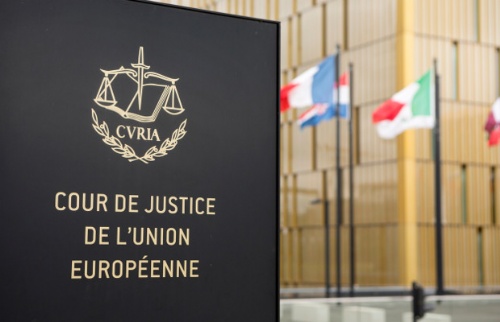Now in its twelfth year, Class 46 is dedicated to European trade mark law and practice. This weblog is written by a team of enthusiasts who want to spread the word and share their thoughts with others.
Click here subscribe for free.
Who we all are...
How long is too long? The CJEU on (dis)proportionate criminal sentences over TM infringement
With its judgment in Case C-655/21, the CJEU has ruled that a 5-year imprisonment term for aggravated criminal TM infringement is disproportionate and runs contrary to Article 49 (3) of the Charter of Fundamental Rights of the EU, which establishes the principle of proportionality in criminal sanctions.
 A preliminary ruling request by a Bulgarian criminal court, the case revolved around criminal proceedings against a Bulgarian trader who was criminally prosecuted for offering for sale counterfeit clothes of dozens well-known brands, following the raid in his premises of a Bulgarian law enforcement authority. The referring court seemed to have a very clear view of the matter; it thought that the threatened 5-year sentence for aggravated TM counterfeiting is “extremely long” and appeared to doubt whether EU law allows TM counterfeiting to be sanctioned as both an administrative and a criminal offense. As, apparently Bulgarian law did not really allow for a lighter sentence, leaving the referring court with little room, it decided to stay proceedings and seek the CJEU’s guidance.
A preliminary ruling request by a Bulgarian criminal court, the case revolved around criminal proceedings against a Bulgarian trader who was criminally prosecuted for offering for sale counterfeit clothes of dozens well-known brands, following the raid in his premises of a Bulgarian law enforcement authority. The referring court seemed to have a very clear view of the matter; it thought that the threatened 5-year sentence for aggravated TM counterfeiting is “extremely long” and appeared to doubt whether EU law allows TM counterfeiting to be sanctioned as both an administrative and a criminal offense. As, apparently Bulgarian law did not really allow for a lighter sentence, leaving the referring court with little room, it decided to stay proceedings and seek the CJEU’s guidance.
The CJEU thought similarly with the referring court. The gist of its ruling lies in answering the fourth question of the referring court, namely whether imposing a long-term custodial sentence of a minimum of five years up to eight years and a heavy fine, in addition to the confiscation and destruction of the counterfeit goods would be compatible with the principle of proportionality enshrined in Art. 49(3) of the Charter of Fundamental Rights of the European Union.
Relying on what it understood as broad scope of the relevant Bulgarian law provisions, the CJEU ruled that said law “makes excessively difficult the competent authorities’ task of setting, having regard to all of the relevant factors, a penalty with a degree of severity that does not exceed the seriousness of the offence identified” [para 84]. It is interesting that the CJEU expressed concerns over disproportionate possibilities of application of the law, which are quite distinct from the case at hand.
 The judgment raises questions. Conventional anti-counterfeiting wisdom of suggests that, in circumstances such as those of this case, there is an organized counterfeiting business that is being cracked down. When uncovering counterfeit merchandise amounting to a 700.000 EUR worth for the genuine goods, one should normally understand that the counterfeiters have already made significant profits. So this is a serious financial crime calling for serious, deterrent criminal sanctions. The CJEU’s judgment shouts “victimless crime” mentality and this is not good news for brand owners and law enforcement authorities.
The judgment raises questions. Conventional anti-counterfeiting wisdom of suggests that, in circumstances such as those of this case, there is an organized counterfeiting business that is being cracked down. When uncovering counterfeit merchandise amounting to a 700.000 EUR worth for the genuine goods, one should normally understand that the counterfeiters have already made significant profits. So this is a serious financial crime calling for serious, deterrent criminal sanctions. The CJEU’s judgment shouts “victimless crime” mentality and this is not good news for brand owners and law enforcement authorities.
It’s also hard to grasp the referring court’s argument, which the CJEU endorses, relating to the destruction of the counterfeit goods as adding to the severity of the penalties imposed. Is it not a given that counterfeit goods should stay off the market? Why is the destruction of counterfeit goods factored in the question of proportionality? It should go without saying that a TM infringer should not be allowed to keep the counterfeit goods.
It further seems irrelevant whether brand owners have initiated civil proceedings or not to recover their damage. As well known to those who are involved in anti-counterfeiting, getting money back is even more difficult than identifying and prosecuting organized counterfeiters. Perpetrators rarely, if ever, have assets in their own name, so, it makes little sense for brand owners to file damages actions and spend money and resources, only to gain an unenforceable judgment. The Court seems to be suggesting that if a brand owner does not pursue a damages action, the infringer should be treated more leniently. But there is nothing in the law to support such argument.
Overall, the CJEU, like the referring court, seems to have first decided 5 years is too long a penalty and then to have looked for arguments to support its position. But, it is highly questionable whether these arguments are valid.
*Thank you to my colleague Maria Tsakou for assisting with this piece.
Posted by: Nikos Prentoulis @ 09.16Tags: CJEU, criminal, proportionality, sanctions, infringement, bulgaria,prentoulis, ,


 Sharing on Social Media? Use the link below...
Sharing on Social Media? Use the link below...Perm-A-Link: https://www.marques.org/blogs/class46?XID=BHA5224

